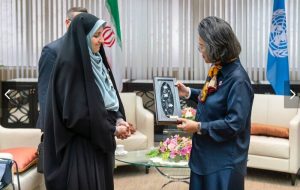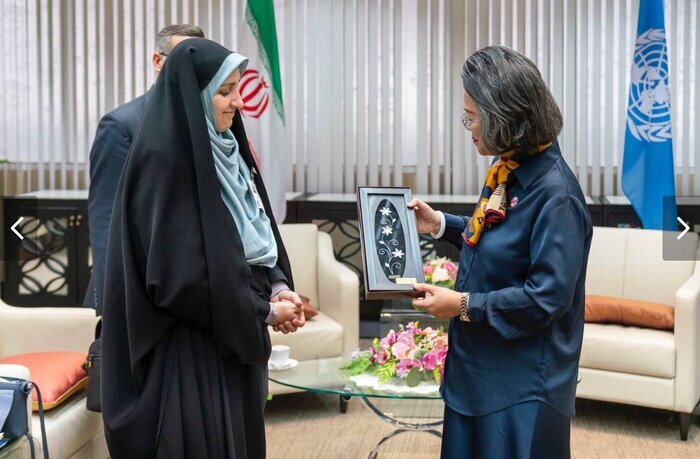Iran, ESCAP to cooperate on empowering women, dealing with natural hazards
TEHRAN –The Vice President for Women and Family Affairs, Zahra Behrouz-Azar, and the Under-Secretary-General of the United Nations and Executive Secretary of the Economic and Social Commission for Asia and the Pacific (ESCAP), Armida Salsiah Alisjahbana, have agreed to collaborate on empowering women as well as dealing with natural and environmental disasters. In a meeting


TEHRAN –The Vice President for Women and Family Affairs, Zahra Behrouz-Azar, and the Under-Secretary-General of the United Nations and Executive Secretary of the Economic and Social Commission for Asia and the Pacific (ESCAP), Armida Salsiah Alisjahbana, have agreed to collaborate on empowering women as well as dealing with natural and environmental disasters.
In a meeting held on Thursday in Bangkok on the sidelines of the Asia-Pacific Ministerial Conference in Thailand, the officials discussed ways for boosting cooperation, Borna reported.
ESCAP convened the Asia-Pacific Ministerial Conference on the Beijing +30 review in collaboration with the UN Women Regional Office for Asia and the Pacific, in Bangkok, from November 19 to 21.
During the meeting, Alisjahbana announced ESCAP readiness to enhance cooperation with Iran and share its expertise with the country, particularly in combating sand and dust storms.
Lauding Iranian girls and young women’s interests and efforts in learning science and developing new technologies, she called for boosting international cooperation and transferring Iran’s expertise and experiences to other countries.
Behrouz-azar, for her part, pointed out the negative impacts of unfair, unilateral sanctions and environmental challenges on the quality of life of women and children.
She also highlighted that the gender gap in education in Iran has lowered to three percent.
The official went on to express optimism that the two sides would jointly work to define and implement projects that aim at increasing women’s resilience against crises and natural disasters.
Iran aims to promote women’s economic, social empowerment
Addressing the Asia-Pacific Ministerial Conference, Behrouz-Azar stated that the current administration focuses on empowering women in social and economic areas, as well as improving their access to social services and facilities through implementing certain national programs.
“Iran has always focused on programs that empower women, particularly those who are heads of household, economically and socially. Actions taken by the country have always aimed to promote women’s status by observing the principles of the constitution and Islamic teachings,” Mehr news agency quoted Behrouz-Azar as saying.
Referring to Iran’s remarkable achievements in education, health, science, technology, and entrepreneurship, she underscored the prominent role of Iranian women in these fields.
The official further said the seventh National Development Plan has stressed the need to overcome barriers to women’s professional development. Accordingly, the current administration has put supporting women’s entrepreneurship and home business growth on the agenda despite unfair sanctions.
Asia-Pacific Ministerial Conference
The Conference brought together Ministers, senior officials, and representatives from relevant Ministries, civil society organizations, youth organizations, academia, the private sector, UN entities, independent experts, and other key stakeholders from across the Asia-Pacific region to assess progress in the implementation of the Beijing Declaration and Platform for Action (BPfA) in Asia and the Pacific over the past five years.
It also aimed to review current and emerging challenges, good practices, lessons learned, and priority actions required to achieve gender equality and the empowerment of women and its contribution towards the full realization of the 2030 Agenda for Sustainable Development, and provide a platform for member States and stakeholders to explore policy options and strategies, including innovative approaches, toward realizing gender equality and the empowerment of women.
The other goals were to build regional consensus on priority actions to accelerate the implementation of commitments made in the BPfA, and consolidate regional inputs to the sixty-ninth session of the Commission on the Status of Women which will focus on the review and appraisal of the implementation of the Beijing Declaration and Platform for Action and the outcomes of the 23rd special session of the General Assembly.
MT/MG
